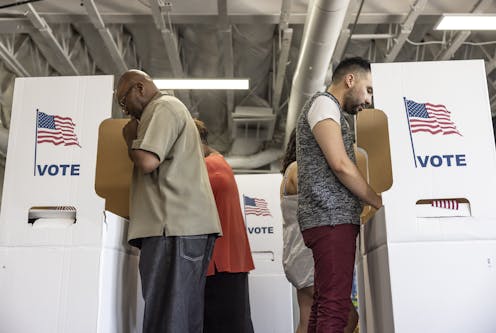Grassroots efforts to increase voting are gaining momentum in these states, even as other states mak
Americans have been hearing for years that democracy is being eroded and is literally at stake in the upcoming presidential election. But there is good news on the voting front as well.

Many people justifiably believe that democracy is under attack in the U.S. and the country’s election system is at risk.
But some good news gets lost in the many reports of doom. Many states in recent years have made significant advances toward promoting a more inclusive democracy.
I’ve worked in the voting rights and political participation field for over two decades. I’ve seen all the forces working against fair elections. Yet in my perspective, the past two years have also been groundbreaking in terms of advancing the right to vote.
Expanding the vote in Minnesota
Take Minnesota, for example. There, in 2023, the state legislature passed, and the governor signed, the Democracy for the People Act. This omnibus bill contained landmark voting rights and election reform advances:
● It allows 16- and 17-year-olds to preregister to vote and have their registration automatically activated when they turn 18.
● It establishes automatic voter registration at all motor vehicle agencies and at public assistance agencies that serve primarily low-income people.
● It permits voters to opt in to a permanent absentee voter list so that they will be sent an absentee ballot every year rather than having to reapply at every election.
● It mandates that sample ballots and voting instructions be written in multiple languages and requires language translation to be available at the polls in areas where the state has determined a certain percentage of citizens speak a language other than English.
● It strengthens the penalties for voter intimidation and deception.
A different law in 2023, the Minnesota Restore the Vote Act, restored the voting rights of more than 55,000 citizens who had been convicted of a felony.
Previously, Minnesotans had to serve out their probation and parole before they were eligible to vote, a process that could last up to several years or even decades for some. Now, they are immediately eligible to vote upon release from incarceration.
Increasing voting access in New Mexico
In 2023, the New Mexico Voting Rights Act included a range of initiatives that would make it possible for some people to vote who’d been denied that right, and make voting much easier for others who faced great obstacles.
That legislation contain a range of measures:
● It restores the voting rights of formerly incarcerated people immediately upon release from prison.
● It expands voting access on tribal lands by securing early voting, allowing tribes to request ballot drop boxes and designating additional locations for reservation residents without mailing addresses to use as voter registration addresses.
● It requires every county to have at least two ballot drop boxes, making absentee and mail voting more accessible.
● It mandates same-day registration at all polling locations during early voting and on Election Day.
● It creates a permanent absentee voter list so that people do not need to reapply for a mail ballot every election.
● It mandates Election Day as a school holiday.
Coalitions work
Michigan and Nevada similarly saw huge victories for voters in the past two years.
Changes in Michigan were largely due to the work of a coalition of organizations formed in the state in 2018 called Promote the Vote, which succeeded in passing a voting-related ballot initiative in 2022 and, in 2023, getting a number of voting rights bills through the Legislature.
Prop 2, which passed with 60% of the vote, included nine days of early in-person voting; a repeal of the ban on transportation to the polls; the option of permanent mail ballot status; and a requirement that drop boxes for mail ballots be provided by town election officials. The legislation also expanded the IDs that could be used for voting and provided prepaid postage for mail ballots.
In Nevada, organizers worked with the state Legislature to pass a number of different measures that together over the past few years have included vote centers that must be located on tribal land unless the tribe formally objects; all voting to be conducted by mail, with every active registered voter being mailed a ballot; and same-day registration so that voters can register and vote during early voting and on Election Day.
Key to successes – leadership from the grassroots
A common thread flowing through all four states was the key role statewide grassroots groups played in getting the laws passed.
Organizers from the most affected communities became the leaders of these campaigns. Great policy ideas that come from policy-oriented organizations are obviously necessary for progress in this realm, but bringing people who create a demand is necessary for wins.
For example, in Minnesota, the Restore the Vote Coalition was led by people who had been incarcerated themselves. Their advocacy brought home to lawmakers the real stories and the real faces of felon disenfranchisement. The We Choose Us Coalition was a multiracial, multi-issue group that mobilized a broad set of constituencies to persistently demand changes to make elections more inclusive.
In New Mexico, NAEVA, which advocates for Indigenous communities across the state, brought the Indigenous community to the Legislature so they could hear from them directly, not through lobbyists. A grassroots coalition led by Organizers in the Land of Enchantment organized communities across the state to work together for these voting measures under an umbrella of the shared values of empowering their communities and improving the lives of working people rather than individual interests.
Aiming for impact
After these hard-won victories comes another challenge: implementing these laws so that new registration and voting opportunities are taken. Secretaries of state and local election officials in these states and across the country are working with organizers to ensure the mechanics involved in administering these laws are in place so that these new voting and registration opportunities are working effectively for voters.
Organizers are also working creatively to ensure voters know that registering to vote and casting a ballot have both gotten easier. In Las Vegas, they had a mariachi band lead the way to an early voting site and held K-pop concerts promoting same-day registration. Organizers in Michigan have hosted music festivals to educate young people about early voting and developed exhibits at museum-based polling places curated specifically to attract young voters.
Scholars have demonstrated for years the potential impact of election reform laws, but the effects could be much more far-reaching with efforts such as these.
In these states, organizers were key to passage of new laws to expand the vote that can make elections more inclusive. Organizers are now central to making the potential of those reforms live up to their promise.
Tova Wang does not work for, consult, own shares in or receive funding from any company or organization that would benefit from this article, and has disclosed no relevant affiliations beyond their academic appointment.
Read These Next
AI’s growing appetite for power is putting Pennsylvania’s aging electricity grid to the test
As AI data centers are added to Pennsylvania’s existing infrastructure, they bring the promise of…
Why US third parties perform best in the Northeast
Many Americans are unhappy with the two major parties but seldom support alternatives. New England is…
Abortion laws show that public policy doesn’t always line up with public opinion
Polls indicate majority support for abortion rights in most states, but laws differ greatly between…





